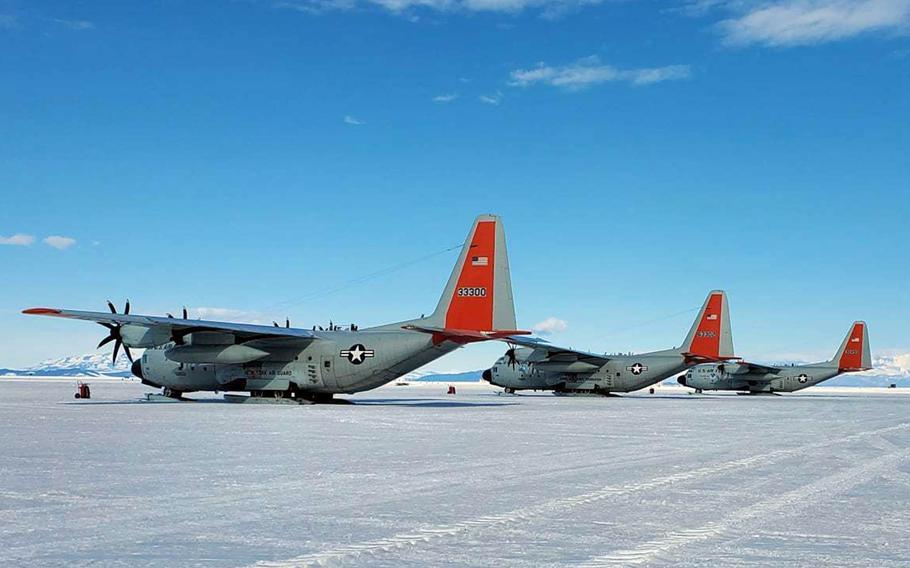
LC-130s sit on the flight line at McMurdo Station, Antarctica, in 2021. The aircraft is equipped with retractable skis that allow it to take off and land on snow and ice as well as on conventional runways. (Dominic Tyler/U.S. Air Force)
Operation Deep Freeze, the U.S. military mission to support scientists working in Antarctica is underway, Pacific Air Forces confirmed Wednesday after an announcement by New Zealand officials.
More than 1,000 scientists, support staff and military personnel live and work at McMurdo Station during the southern hemisphere summer, when the frozen continent sees perpetual daylight.
The National Science Foundation invests more than $400 million in Antarctic research each year through the U.S. Antarctica Program, according to a State Department fact sheet released Tuesday.
The foundation’s goals include understanding Antarctica, learning about the region’s effects on and responses to global processes such as climate, according to the foundation’s website.
The Air Force is conducting WinFly, or winter fly, missions to move personnel, equipment and supplies to Antarctica ahead of the research season, Capt. Christopher “Casper” Merian said in an email Wednesday.
“The next WinFly mission is scheduled to begin this week and will run through October,” he said.
Christchurch Airport on New Zealand’s South Island, which hosts National Science Foundation and Air Force personnel supporting the Antarctic endeavor, tweeted Sunday that an Air Force C-17 Globemaster III was due to land there that evening to prepare to take people and machinery to the ice.
The season’s first WinFly mission in August involved three C-17 flights that delivered 184 people and 139,000 pounds of cargo to McMurdo and returned 22 people and 75,000 pounds of cargo, Merian said.
The transport jets are assigned to the 62nd Airlift Wing out of Joint Base Lewis-McChord, Wash. LC-130 airlifters, equipped with skis that allow them to land on snow and ice, are also participating in the mission. They’re from the 109th Air Wing at Stratton Air National Guard Base in Scotia, N.Y.
The LC-130s operate out of McMurdo and the C-17s operate out of Christchurch, Merian said.
A Military Sealift Command tanker, a chartered container ship and a U.S. Coast Guard icebreaker will also travel to the ice this season, he said.
U.S. Navy Cargo Handling Battalion One is providing port services at Port Hueneme, Calif., and at McMurdo.
Operation Deep Freeze, which dates to 1955, includes strategic and tactical airlift, airdrop, aeromedical evacuation support, search and rescue, sealift, bulk fuel supply and cargo handling, Merian said.
“The 2022-23 season is another opportunity to demonstrate our military dedication, ingenuity and labor in support of the Antarctic mission,” Lt. Col. Matthew Johnson, Joint Task Force – Support Forces Antarctica’s acting deputy commander, said in comments emailed Tuesday by PACAF.
Operation Deep Freeze runs through July 31, 2023, allowing researchers and others to accomplish missions during the safest weather, Merian said.